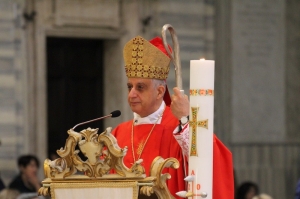When sermons are successful

2012-07-17 L’Osservatore Romano
This year, before every event that took place at the Spoleto Festival in the theatres and concert halls the voice that presented the programme of the day alternated the announcement of plays, concerts and ballets with that of seven homilies preached on the seven capital vices [or deadly sins]. Yes, real sermons, those boring sermons that everyone shuns like the plague but which, on the contrary, almost inexplicably drew hundreds of people to the Church of San Domenico, a huge throng, constantly increasing despite the heat of the sultry afternoon. However, this was not solely due to curiosity to see and hear from close at hand famous figures such as Cardinal Gianfranco Ravasi or Brother Enzo Bianchi for even lesser known people, such as Mons. Andrea Lonardo, who talked about the vice of gluttony, brought the house down.
The project was popular because the preachers – all excellent and all of whom had conscientiously prepared themselves – spoke about our lives and explained, in a manner that today may turn out to be new, the meaning of the discomfort and unhappiness to which they are often subject. We have long been used to explaining our existential difficulties on the basis of psychological parameters which, reduced to superficial divulgation, all too often consist in blaming others for our errors or, even less honourably, in looking at the positions of planets. The Spoleto homilies instead were a further source of inspiration for reflection, taking up concepts that seemed to have been forgotten. Many of the habits considered praiseworthy today are in fact vices that poison our soul and hence our life. Joy, the desire for a career and an income, the search for pleasure at all costs, the nihilism of those who do not believe in anything preached by so many of our highly esteemed maitres á penser, are not healthy practices for living but rather are the road to anxiety, depression and loneliness.
It was Archbishop Rino Fisichella who framed this issue in the inaugural homily he preached on pride, the first of the vices. For as he explained, all the other vices derive from this, in other words from the human presumption of being able to dispense with God and disregard his commandments. And Archbishop Fischella explained that the practice of vices tends to take root, transforming a single wrong act into a harmful habit. The most distressing vice, the most difficult to diagnose, is acedia which strikes, precisely, the custom of virtue, of which it denies all meaning. Monsignor Pierangelo Sequeri enlightened a very attentive audience on acedia, which is expressed as revulsion for spiritual seeking and an obsessive withdrawal into narcissism. He told the story of a medieval Benedictine, Othlo of St Emmeram, smitten by this vice, who was able to fight and overcome it.
All seven of the homilies were in fact full of illuminating citations which recalled or taught that Christian culture is a treasure trove of texts focused on knowledge of the human soul, on which it is always possible to draw profitably, even many centuries later. Moreover, few of the listeners – of whom a great many were not used to going to church – really knew that not only does envy poison hearts but it also destroys human relationships, as Archbishop Vincenzo Paglia clearly explained; or that there is also a spiritual greed, perhaps even more hateful than material greed, practised by those who are miserly with their time or are attached to their jobs and loath to give them to anyone, Archbishop Renato Boccardo revealed.
Vices can be treacherous because they also have a positive facet, such as anger, which – Prior Bianchi said – even Jesus felt, but without it becoming a sign of contempt for the other person as happens frequently with human anger. And in any case we must always consider that every vice has an opposite, positive side, presented by Cardinal Ravasi, when he introduced his talk on lust through a reflection on love.
And if in summing up at the end of the Festival Giorgio Ferrara, Director of the Festival, mentioned the success of the sermons in a discourse which obviously focused on public attendance and the reactions of the critics, it is also necessary to remember that this initiative, in collaboration with the Pontifical Council for the Promotion of the New Evangelization, was above all an excellent example of communicating the Christian tradition outside its classic context. In this way, it introduced so many people who would not easily enter a church to hear a Mass, and hence a homily, to the wealth of thought and stimuli that can be offered by a great tradition which – as many seem to have forgotten – can rightly claim to be an expert in humanity.
Lucetta Scaraffia



